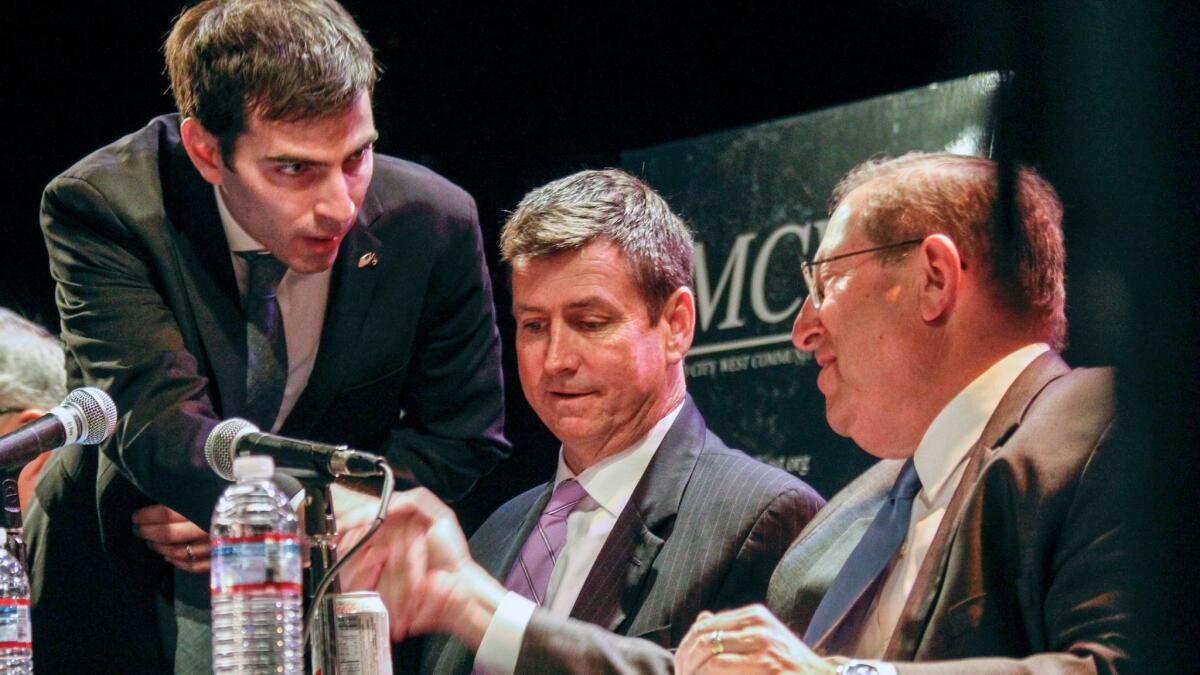Councilman Paul Koretz fights for a third term on L.A.’s Westside

- Share via
The last time Los Angeles City Councilman Paul Koretz ran for reelection, he had an easy time of it.
Koretz’s lone opponent in 2013 spent less than $98. The councilman sent a few mailers and breezed to victory, capturing 75% of the vote in his affluent Westside-to-Encino district.
The competition is more intense in this year’s run-up to Tuesday’s election, thanks largely to a challenge from Jesse Creed, an attorney who has tapped a reservoir of campaign donations from lawyers and the entertainment industry.
In debates and in campaign mail, Koretz and Creed have traded charges over ethics, real estate development and the influence of special interests. The campaign’s overall cost has already exceeded $750,000.
Creed went on the attack early, slamming Koretz for accepting tens of thousands of dollars in donations from real estate interests — a practice that, while legal, has become more controversial amid a citywide debate over growth. He contends that a “pay-to-play culture” at City Hall is resulting in poor planning, congested streets and an overburdened infrastructure.
“Political money leads to bad developments that are not transit-oriented,” said Creed, who lives in L.A.’s Beverly Grove neighborhood. “And bad developments that are not transit-oriented lead to a ton more traffic.”
Koretz, also a Beverly Grove resident, has turned the tables on Creed, filing a complaint accusing him of illegally coordinating with an outside campaign group. Creed has denied that claim.
The councilman also says he has a track record of standing up to special interests, including those who have donated to him, by opposing projects ranging from Bel-Air mansions to the sprawling Playa Vista development.
Koretz also voiced support for full public financing of campaigns, saying such a measure would address the perception that “pay to play” influences council decisions.
“I can’t say that’s absolutely untrue of every council member. But I can say that of me,” Koretz told one debate audience. “If you look at the projects I’ve opposed, I’ve ticked off my supporters. I’ve ticked off labor especially.”
Development has been a long-standing issue in Koretz’s 5th Council District, which takes in such well-to-do communities as Bel-Air, Beverly Crest, Carthay Circle, Cheviot Hills and Westwood. But the topic is especially potent this year, thanks to the campaign over Measure S, which would put new restrictions on construction of housing, shops and offices.
Creed and Koretz oppose Measure S, saying it would impede efforts to build affordable housing. A third candidate in the race, political consultant Mark Herd, favors the proposal, saying it will address traffic and the influence of political money.
“The only way we stop this corruption in government is if we vote yes on Measure S,” Herd said at a Westwood campaign event.
Herd challenged Koretz unsuccessfully in 2013, then went on to lose races for Congress and U.S. Senate. As of Feb. 18, he had not reported raising any money, relying instead on Facebook and other methods to spread his message.
Council District 5 has some of the most organized neighborhood groups in the city, which have used their money and clout to square off against well-funded developers and lobbyists.
Koretz, for his part, says he has been the most “anti-development” member of the council — with the possible exception of Councilman David Ryu, who was elected in 2015. At the same time, he portrays himself as someone who works to ensure that developers and their critics work together and hash out their differences.
“Every developer wants to build in CD 5,” he said. “And almost every resident wants nothing built.”
A political veteran, Koretz has served in the state Assembly and on two City Councils — first West Hollywood, later L.A. He is backed by Mayor Eric Garcetti, who employs his wife, and an array of other politicians. Despite his assertion he antagonized unions, the Los Angeles County Federation of Labor has spent more than $105,000 to help him win a third term.
Koretz has touted his wide-ranging support from neighborhood leaders. And he has repeatedly portrayed Creed as an opportunistic newcomer with no record of accomplishment in the district.
“It’s just odd,” he told The Times. “You rarely see someone run for office as a serious candidate that has done nothing in their district.”
Creed disagrees with that assessment, pointing to his work helping to develop a plan for constructing 1,200 units of homeless housing at the Veterans Affairs campus in West Los Angeles. Although that facility is just outside the 5th District, it will serve veterans across the Westside, he said.
The Toronto-born Creed spent four years with the firm Munger, Tolles and Olson specializing in nonprofit law, then quit to run for council full time. He continues to sit on the board of Equitas Academy, a group of charter schools.
Creed contends that Koretz has been follower, not a leader, on issues that emerged during the campaign. One example, he said, was Koretz’s decision last fall to support a 20-story residential tower near the Beverly Center.
Creed came out against the project at a Dec. 30 news conference, saying it was too tall and needed more affordable housing. Hours later, Koretz abruptly called his own press event at the same intersection, announcing he had rescinded his support and wanted more concessions.
After developer Rick Caruso reduced the project’s height and offered more money for affordable housing, Koretz backed it again.
Koretz hailed the result as a compromise. But Century City resident Greg Laemmle, a Creed supporter, believes Koretz acted only because an opponent had brought up the issue.
“If the issue hadn’t been raised in that fashion, Paul would have been happy to let it go forward as it was,” he said.
Creed contends he also led on campaign finance, by promising early in the campaign not to accept donations from real estate developers. Later on, Koretz signed on to a council proposal to bar developers from giving donations to city elected officials.
Koretz said that proposal would not have garnered support from so many council members before the campaign. Creed countered that Koretz had years to build consensus. “I’ve led and Paul has followed,” he said.
That view was not shared by Steven Luftman, a resident of South Carthay who has worked with Koretz to prevent rent-controlled apartments from being demolished — and tenants from being evicted.
Luftman praised Koretz for championing a proposal to put new limits on mansionization, the practice of building extra-large homes on small lots. Koretz also showed courage, he said, in creating a new historic district in Carthay Square despite pushback from some property owners, he said.
“I have dealt with [Koretz] on multiple occasions,” said the 55-year-old art director. “And he has always done the right thing.”
If Koretz fails to secure more than 50% of the vote, the top two candidates will face off in a May 16 runoff. L.A. voters have a long history of siding with incumbents, making that scenario less likely.
Since 1995, incumbents at City Hall have won reelection in 64 out of 67 contests.
Twitter: @DavidZahniser
More to Read
Sign up for Essential California
The most important California stories and recommendations in your inbox every morning.
You may occasionally receive promotional content from the Los Angeles Times.














